Unit_4_Astronomy_the_science_of_the_stars公开课课件
最新高考英语一轮复习-Unit-4-《Astronomy-the-science-of-the-stars》重点梳理现题解析
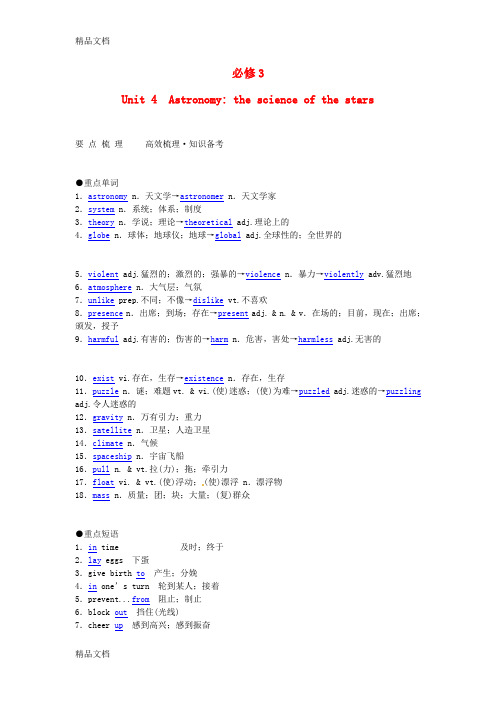
必修3Unit 4 Astronomy: the science of the stars要点梳理高效梳理·知识备考●重点单词1.astronomy n.天文学→astronomer n.天文学家2.system n.系统;体系;制度3.theory n.学说;理论→theoretical adj.理论上的4.globe n.球体;地球仪;地球→global adj.全球性的;全世界的5.violent adj.猛烈的;激烈的;强暴的→violence n.暴力→violently adv.猛烈地6.atmosphere n.大气层;气氛7.unlike prep.不同;不像→dislike vt.不喜欢8.presence n.出席;到场;存在→present adj. & n. & v.在场的;目前,现在;出席;颁发,授予9.harmful adj.有害的;伤害的→harm n.危害,害处→harmless adj.无害的10.exist vi.存在,生存→existence n.存在,生存11.puzzle n.谜;难题vt. & vi.(使)迷惑;(使)为难→puzzled adj.迷惑的→puzzling adj.令人迷惑的12.gravity n.万有引力;重力13.satellite n.卫星;人造卫星14.climate n.气候15.spaceship n.宇宙飞船16.pull n. & vt.拉(力);拖;牵引力17.float vi. & vt.(使)浮动;(使)漂浮 n.漂浮物18.mass n.质量;团;块;大量;(复)群众●重点短语1.in time 及时;终于2.lay eggs 下蛋3.give birth to产生;分娩4.in one’s turn 轮到某人;接着5.prevent...from 阻止;制止6.block out挡住(光线)7.cheer up感到高兴;感到振奋8.now that 既然9.break out突发;爆发10.watch out密切注视;当心;提防11.cool down 冷却12.as well as 也;还有……13.depend on依靠;依赖,取决于14.get close to 靠近●重点句型1.This produced a chain reaction, which made it possible for life to develop. 这就形成一个连锁反应,使生命发展成为可能。
Unit_4_Astronomy_the_science_of_the_stars公开课课件 ppt

Astronomy is the scientific study of the universe and the heaven bodies (such as the sun, the moon, and stars), gas, and dust within it.
astronomer
solar system
• eight planets • many comets • other objects
What are the English names of the eight planets that circle our sun?
金星 Venus
火星 Mars
2. What has happened after that? Atoms began to form and combine to create stars and other bodies.
A Big Bang
atom
stars
Reading for information: Para 2
For several million years after the" Big Bang"...
Stage2 The development of life
Reading for information: Para 4-5 Make a timeline of the development of life:
ertremely small plants appears in water
Shellfish and all sorts of fish
between 4.5 and 3.8years ago
高中英语Unit4AstronomythescienceofthestarsSectionⅣGram

高中英语Unit4AstronomythescienceofthestarsSectionⅣGrammarⅠ.完成句子1.他在这场事故中幸免于难,真是奇迹。
That he survived the accident is a miracle.2.他为什么又是如何去了美国至今还是个谜。
How and why he went to America is still a mystery.3.学生们需要的是知识。
What the students need is knowledge.4.任何一个违反此规章制度的人都要受罚。
Whoever breaks the rule shall be punished.5.令人惊奇的是玛莉竟然获得了第一名。
It is surprising that Mary should have won first place.Ⅱ.阅读理解AHave you come across much western children's literature?Most English speaking children grow up with the same delightful set of fictional (小说的) characters.The Winnie the Pooh stories involve a strange selections of animals such as a kangaroo, a pig, a donkey, a tiger, an owl and a bear, who live together in a wood, leading fairy ordinary lives.Far more exciting and dangerous events take place in The Wind in the Willows,the story of the foolish Mr.Toad and all his adventures.Talking animals is also the main characters in The Jungle Book and the Just So Stories.In the latter we find lots of imaginative explanations as to why the world is like what it is.Far more laughter comes from Roald Dahi's Charlie and the Chocolate Factory.Whillie Wonka is the perfect adult in the eyes of children with all his clever ideas and endless supply of sweets.Also much loved is Bilbo Baggins, the funny little rabbit, who ends up having adventures with wolves and dragons.Of course, the stories go on in the much more serious The Lord of the Rings,better read a few years later.A new star in the world of magic and children's fiction is Harry Potter,the schoolboy who learns spells rather than maths.Adventures books remain popular, too.Although well over a century old now,Treasure Island is still an enthralling story with young Jim Hawkins dealing with secret maps and pirates.Such books make childhood a time of wonder and imagination.1.Which of these is NOT mentioned as a character in The Winnie the Pooh stories?【解析】细节理解题。
高中英语 Unit 4 Astronomy the science of the stars

Unit 4 Astronomy:the science of the stars 【美文阅读】关于大地起源的神话有许多许多,你了解多少呢?The sky and the earth were at first one blurred entity(混沌整体) like an egg. Then Pangu was born into it. The separation of the sky and the earth took eighteen thousand years. The yang which was light and pure rose to become the sky,and the yin which was heavy and murky(黑暗的)sank to form the earth. Between them was Pangu, who went through nine changes every day, his wisdom greater than that of the sky and his ability greater than that of the earth. Every day the sky rose ten feet higher, the earth became ten feet thicker, and Pangu grew ten feet taller. Another eighteen thousand years passed, and there was an extremely high sky, an extremely thick earth, and an extremelytall Pangu. After Pangu died, his head turned into the Five Sacred Mountains(Mount Tai, Mount Heng, Mount Hua, Mount Heng, Mount Song), his eyes turned into the moon and the sun, his blood changed into water in river and sea, his hair into grass. In all, the universe and Pangu combine in one.【诱思导学】1.Do you agree on the forming of the universe?Give your reasons.________________________________________________________________________________________________________________________________________________2.What kind of people is Pangu in your eyes?________________________________________________________________________________________________________________________________________________【答案】 1.No,I don't agree.Because the scientists have already found out how the universe formed.2.I think Pangu is very great and determined.He is a hero.Period ⅠPreviewing(教师用书独具)●教学目标本课时主要是通过学生对学案所给出的内容的学习,了解本课文中所出现的词汇,初步了解课文以及相关的背景知识,就下一堂课对课文的全面理解起到一个铺垫作用。
Unit 4 Astronomy_ the science of the stars 教学设计3

Unit 4 Astronomy: the science of the stars教学案3第一部分教学设计Period 3 A sample lesson plan for Using Language(A VISIT TO THE MOON)IntroductionLanguage is learned to be used in and for communication. So in this period we shall have the students read, listen, write and speak in English, making use of the focused words, expressions, structures and topic ideas covered in this unit.The following steps can be ta ken: warming up by listening and reading aloud, understanding difficult sentences, reading and underlining, doing reading comprehension exercises, discussing, guided writing, acting a text play and closing down by filling a form.ObjectivesTo enjoy the passage A VISIT TO THE MOONTo learn to use the language by reading, listening, speaking and writingProcedures1. Warming up by listening and reading aloudLet’s listen to the recording of the text A VISIT TO THE MOON, and then read it aloud.2. Understanding difficult sentencesSkim the text A VISIT TO THE MOON and discuss in pairs the difficult points you find.3. Reading and underliningNext you are to read and underline all the useful expressions or collocations in the passage. Copy them into your notebook after class as homework.Collocations from A VISIT TO THE MOONbe lucky enough(足够幸运), have a chance(有个机会), make a trip(去旅行), visit the moon (参观月球), in the spaceship(在太空飞船中), explain to…that…(向……解释……), on the journey(在旅程中), be off(启程), rise into the air(升人太空), feel the pull of the earth (感觉到地球的拉力), call…gravity(称……为地球引力), push…into the seat(把……推向座位), say…to each other(向彼此说……), fall back to…(朝……落下去), fall from a tree (从树上掉下来), fall to the ground(朝地上落下去), get close to…(接近……), feel…~ing (感觉到……正在……), cheer up(高兴起来), float weightlessly around(失重飘来飘去), in the spaceship cabin(太空船舱), watch…do(看着……做), come on(来吧), move freely (自由的活动), grow tall(长高), climb down the steps(从梯级上爬下来), step forward(向前迈步), fall over(摔倒), need practice(需要练习), after a while(过了一会儿), get the hang of…(掌握了……的诀窍), enjoy oneself(感到自如), leave the moon’s gravity(摆脱月球引力), return to…(返回到……), break out(起火,爆发), come back to…(回到……)4. Doing reading comprehension exercisesNow you are going to do exercises on page 31.5. DiscussingIn pairs discuss what you need to take if you would go to the moon.Lunar PuzzlersIf you're standing on the moon and the Earth is directly overhead, how long will it take for our planet to reach the moon's horizon? Make a shot at (guess) this and other lunar brainteasers.Last M an on the MoonGene Cernan, who left man's final footprint on the moon in 1972, describes what it was like to lift off from the launch pad, walk in space, spend three days exploring the lunar surface, and reenter the Earth's atmosphere.Hear the Space PioneersBuzz Aldrin on that first-ever landing. Jim Lovell on the terror of Apollo 13. Listen to the compelling stories of these and other Apollo luminaries who got us to the moon.OriginsThe moon is not made of green cheese but of bits of the Earth blasted in to outer space by a Mars-sized meteor, which struck our planet four and a half billion years ago or so, says the leading theory of how the moon came to be.6. Guided writingNext you are going to write a short article explaining at least three problems you might meet on the moon.Going To The MoonPlan your trip before you goHow will you get there?What will you need?Where can you buy things?At The MoonFind out what’s thereHotelsTransportSportGone To The MoonWhat happens when you come backPicturesReturning to gravityBuried on the moon7. Acting a text playIn groups of four turn the article HOW L IFE BEGAN ON THE EARTH into a text play. One of the group members is to be a space scientist, the other three the lovers of moon exploration. The winning group will be awarded.8. Closing down by filling a formMake use of the text A VISIT TO THE MOON to fill in the following form. Write in verb phrases to tell about the trip.A VISIT TO THE MOONBefore the trip be informed the three changes of the force of gravity; first change most powerful During the trip t ake off; feel the pull of the earth/or gravity; be pushed hard back to seat; talk when the weight lessen; too far to feel the pull; feel the gravity of the moon pulling; cheer up and float weightlessly aroundAfter landing excited when arriving; mass be less; move more freely; might grow taller to stay long enough; weigh less; be carried twice as far when step forward; fell over; get the hang of it; enjoyReturning to the earth leaving the moon not as painful while returning to the earth frightening;fire break out as gravity increase; be pushed hard into seats; exhausting but exciting;。
人教版高中英语必修三Unit4Astronomy:thescienceofthestars课文知识点解析
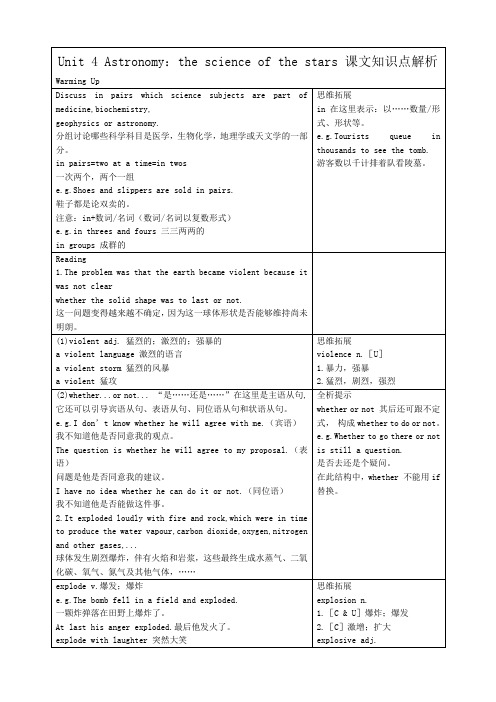
Unit 4 Astronomy:the science of the stars 课文知识点解析Warming UpDiscuss in pairs which science subjects are part of medicine,biochemistry,geophysics or astronomy.分组讨论哪些科学科目是医学,生物化学,地理学或天文学的一部分。
in pairs=two at a time=in twos一次两个,两个一组e.g.Shoes and slippers are sold in pairs.鞋子都是论双卖的。
注意:in+数词/名词(数词/名词以复数形式)e.g.in threes and fours 三三两两的in groups 成群的思维拓展in在这里表示:以……数量/形式、形状等。
e.g.Tourists queue in thousands to see the tomb. 游客数以千计排着队看陵墓。
Reading1.The problem was that the earth became violent because it was not clearwhether the solid shape was to last or not.这一问题变得越来越不确定,因为这一球体形状是否能够维持尚未明朗。
(1)violent adj. 猛烈的;激烈的;强暴的a violent language 激烈的语言a violent storm 猛烈的风暴a violent 猛攻思维拓展violence n.[U]1.暴力,强暴2.猛烈,剧烈,强烈(2)whether...or not... “是……还是……”在这里是主语从句,它还可以引导宾语从句、表语从句、同位语从句和状语从句。
e.g.I don’t know whether he will agree with me.(宾语)我不知道他是否同意我的观点。
高三英语必修三Unit4 Astronomy:the science of the stars ——天文学:恒星科学

3. puzzle vt.& vi.(使)迷惑;(使)为难;(使)窘困;感到迷惑 n.(游戏的)猜谜;难题;谜 (2019·高考江西卷·阅读理解A)But his curiosity was
difficult to control and this new computer really puzzled him. 但是他难以抑制自己的好奇心,并且这台新电脑确实 让他很迷惑。 归纳拓展 (1)puzzle sb.使某人为难 be puzzled by 被……迷惑 puzzle about/over sth.苦苦思索;仔细琢磨 (2)be in a puzzle about sth.对某事迷惑不解 (3)puzzling adj. 令人困惑的 puzzled adj. 感到困惑的
目录
考点串讲讲练互动
[单词精研] 1. exist vi. 存在,生存 (教材P26)They laid eggs too and existed on the earth for more than 140 million years. 它们也生蛋,在地球上生存了一亿四千多万年。 归纳拓展
exist in...存在于……之中 (1)exist on...靠……为生
一个人的智力极限通常来说出生时就已经定型了但他是否能够达到这些极限则取决于他的生活环境
Unit 4 Astronomy:the science of the stars ——天文学:恒星科学
本节目录
基
考
础
点
盘
串
点
讲
自
讲
测
练
自
互
评
动
基础盘点自测自评
[核心单词] 1.__a_s_t_r_o_n_o_m_y____ n.天文学 2. __s_y_st_e_m________ n.系统;体系;制度 3. __t_h_e_o_r_y_______ n.学说;理论 4. _a_t_m__o_sp__h_e_re____ n.大气层;气氛 5. _f_u_n_d_a_m__e_n_t_a_l __ adj.基本的;基础的 6. _t_h_u_s______ adv.因此;于是 7.__a_to_m____ n.原子
高中英语Unit 4 Astronomythe science of the stars教案 5
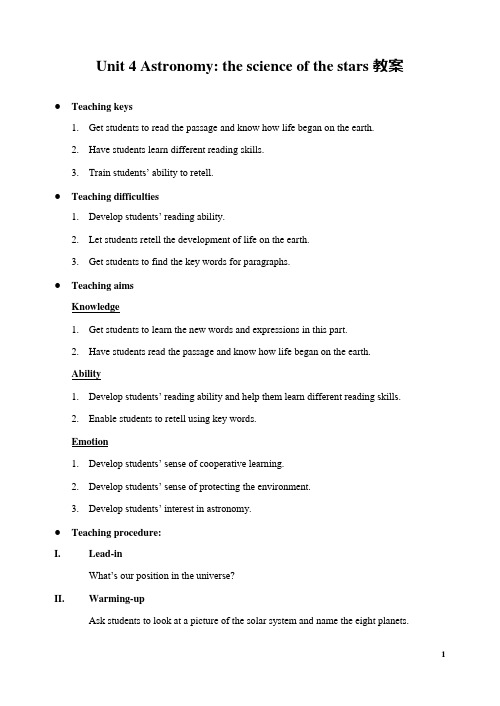
Unit 4 Astronomy: the science of the stars教案●Teaching keys1.Get students to read the passage and know how life began on the earth.2.Have students learn different reading skills.3.Train students’ ability to retell.●Teaching difficulties1.Develop students’ readi ng ability.2.Let students retell the development of life on the earth.3.Get students to find the key words for paragraphs.●Teaching aimsKnowledge1.Get students to learn the new words and expressions in this part.2.Have students read the passage and know how life began on the earth.Ability1.Develop students’ reading ability and help them learn different reading skills.2.Enable students to retell using key words.Emotion1.Develop students’ sense of cooperative learning.2.Develop students’ sense of protecting the environment.3.Develop students’ interest in astronomy.●Teaching procedure:I.Lead-inWhat’s our position in the universe?II.Warming-upAsk students to look at a picture of the solar system and name the eight planets.III.Pre-readingi.Ask students to think about different ideas about how life began on the earth in differentreligions and cultures.ii.Watch a video to help Ss have a general idea of the development of life on the earth. iii.Ask Ss to read the title and look at the two pictures and predict:a.What is the passage about?b.What is the writing style of the passage?A. An narrative writingB. An expository writingC. A persuasive writingc.In what order is the passage developed?A. TimeB. SpaceC. LogicKEYS: a. The passage is about how life began on the earth.b. Bc. AIV.Readingi.Fast-readingAsk students to read the first and last sentences and match the paragraphs with the main ideas.KEYS: 4, 2, 1, 5, 3ii.Divide the passage into 3 parts.Para 1 as Part 1 A widely accepted theory about the formation of the universe.Para 2-4 as Part 2 The life development.Para 5 as Part 3 The arrival of humans and their impact on the earth.iii.Careful-readingPara 1 Ask students to read paragraph 1 and answer the following question: What is this widely accepted theory?Para 2 Ask students to read paragraph 2 and find the key words.Para 3 Ask students to read paragraph 3 and find the key words.Para 4 Ask students to listen to paragraph 4 and find the key words.Answer the following questions based on the key words.1. What made up the earth’s atmosphere after the earth exploded?2. How did water come into being on the earth?3. Why was the presence of water on the earth important?4. What did the small plants on the water provide for the fish?5. What made possible the rise of mammals?KEYS:1. Carbon dioxide, nitrogen, water vapor and other gases.2. As the earth cooled down, water began to appear on the surface.3. It allowed the earth to dissolve harmful gases and acids into the oceans and seas.4. Oxygen.5. The disappearance of the dinosaurs.Para 5 Ask students to read paragraph 5 and fill in the blanks.Finally, ______________appeared and became _____________. However, they are putting too much ___________________ into ___________________.KEYS: some small clever animals, the most important animal in the world, carbon dioxide, the atmosphereiv.Post-readingIn group of four retell the passage using some discourse markers and sentence connectors,according to the expressions given.Group 1 : the universe, Big Bang, the earth, a cloud of dust, a solid globeGroup 2: cool down, water, dissolve, small plants, on the water, shellfish and other fish, developGroup 3: plants, on dry land, insects and amphibians, appear, reptiles, come into beingGroup 4: dinosaurs, mammals, exist, clever animals, carbon dioxide, atmosphereV.WritingSolutions to Global WarmingAsk students to translate some of the solutions and try to add more.1. 停止砍伐树木/森林2. 种植更多的树木3. 减少石油和煤炭的使用4. 使用太阳能、风能等清洁能源5. 在日常生活中节约能源6. 骑单车或乘公共交通工具,而不开车7. 限制车辆尾气的排放Keys: 1. stop cutting down trees/forests 2. plant more trees3. reduce the use of oil and coal4. use clean energy such as solar energy and wind energy5. save energy in our daily life6. by bike or public transportation, rather than driving a car7. limit the emissions of car exhaustVI.HomeworkFinish the composition on Solutions to Global Warming.。
Unit 4 Astronomy the science of the stars4
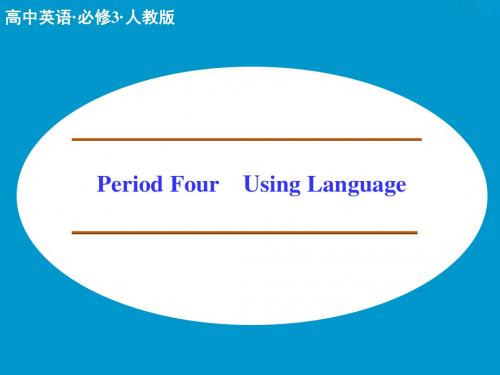
预习导学
课堂讲义
预习导学
Unit 4
Astronomy: the science of the stars
Ⅱ.Phrases: 1.cheer up 感到高兴;感到振奋 2.now that 既然 3.get the hang of 熟悉;掌握;理解
Astronomy: the science of the stars
2.I cheered up immediately and floated weightlessly around
in our spaceship cabin watching the earth become smaller
and the moon larger. 我立刻感到高兴起来,由于失重我在太空舱里飘来飘去, 我望着地球越来越小,而月球越来越大。
预习导学
课堂讲义
课堂讲义
[归纳拓展]
Unit 4
Astronomy: the science of the stars
cheer up 感到高兴;感到振奋
cheer sb up 使某人高兴/振奋
cheer sb on (比赛中以喝彩声鼓励某人;为某人加油 cheerful adj.快乐的;高兴的;兴高采烈的 Cheers! (用于祝酒干杯)
D.Not mentioned in the text.
答案 A
预习导学
课堂讲义
预习导学
Unit 4
Astronomy: the science of the stars
人教新课标高中英语必修三Unit 4 Astronomy_ the science of the starsUnit 4 Astronomy_ the science of t
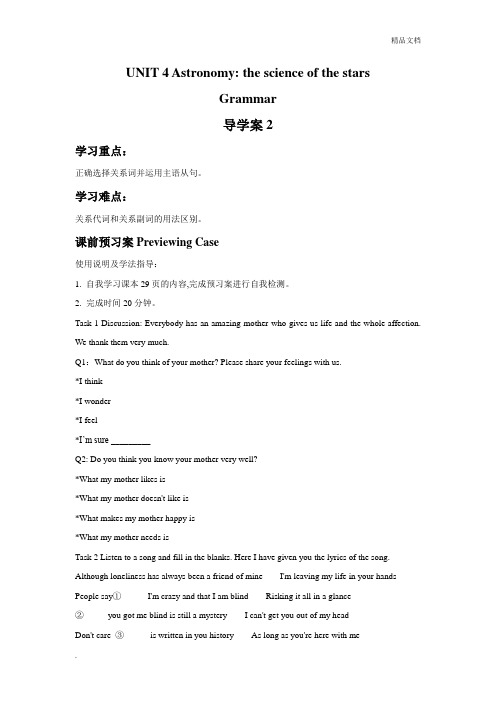
UNIT 4 Astronomy: the science of the starsGrammar导学案2学习重点:正确选择关系词并运用主语从句。
学习难点:关系代词和关系副词的用法区别。
课前预习案Previewing Case使用说明及学法指导:1. 自我学习课本29页的内容,完成预习案进行自我检测。
2. 完成时间20分钟。
Task 1 Discussion: Everybody has an amazing mother who gives us life and the whole affection. We thank them very much.Q1:What do you think of your mother? Please share your feelings with us.*I think ____________________________*I wonder_________________________________*I feel _____________________________*I’m sure _________________________________Q2: Do you think you know your mother very well?*What my mother likes is_____________________________________________________*What my mother doesn't like is________________________________________________*What makes my mother happy is_______________________________________________*What my mother needs is_____________________________________________________ Task 2 Listen to a song and fill in the blanks. Here I have given you the lyrics of the song. Although loneliness has always been a friend of mine I'm leaving my life in your hands People say①______I'm crazy and that I am blind Risking it all in a glance②_____ you got me blind is still a mystery I can't get you out of my headDon't care ③____ is written in you history As long as you're here with meI don't care ④____ you are,_____ you're from,____ you didAs long as you love me Who you are Where you're from Don't care ⑤____ you did As long as you love me Every little thing that you have said and doneFeels like it's deep within me Doesn't really matter if you’re on the runIt seems like(as if)⑥_______ we're meant to beTask 3 Revision: Find the subjects in the following sentences.1. A tree has fallen across the road.2. You are a student.3. To find your way can be a problem.4. Smoking is harmful to you.5. What she said is not yet known.6. That we shall be late is certain.7. It’s certain that we shall be late.Conclusion(from 5&6 ): 主语从句:一个句子在________引导下,在另一个句子中充当______(相当于一个___词)的从句。
Unit4Astronomy-thescienceofthestars
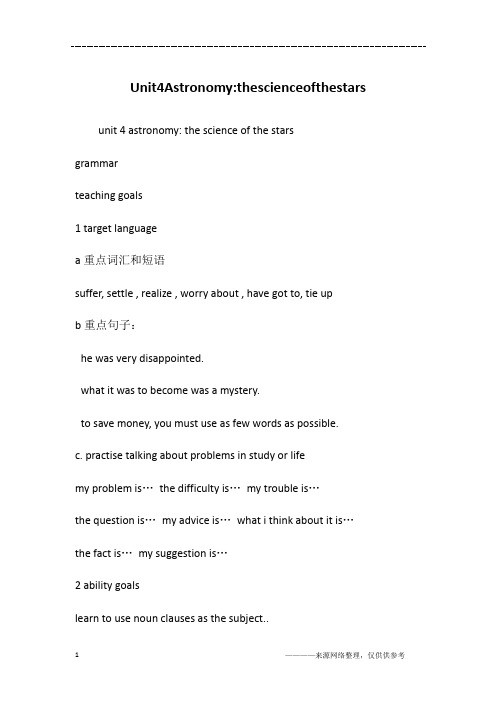
Unit4Astronomy:thescienceofthestars unit 4 astronomy: the science of the starsgrammarteaching goals1 target languagea重点词汇和短语suffer, settle , realize , worry about , have got to, tie upb重点句子:he was very disappointed.what it was to become was a mystery.to save money, you must use as few words as possible.c. practise talking about problems in study or lifemy problem is…the difficulty is…my trouble is…the question is…my advice is…what i think about it is…the fact is…my suggestion is…2 ability goalslearn to use noun clauses as the subject..3 learning ability goalslet ss learn how to use noun clauses as the subjectteaching important pointsthe use of noun clauses as the subjectteaching difficult pointshow to teach the ss to learn to use noun clauses as the subject teaching methodslearn grammar through practiceteaching aidscomputerteaching proceduresstep 1 revision1.check retelling of the passage.the explosion of the earth produced water vapor, which turned into water when the earth cooled down. water allowed the earth to dissolve harmful gases into the oceans and seas. that made it possible for life to begin to develop. the arrival of small plants encouraged the development of early shellfish and all sorts of fish. many millions of yearslater the first green plants began to appear on land. later land animals appeared. some were insects. others, called amphibians, were able to live on land as well as in the sea. when the plants grew into forests, reptiles appeared for the first time. later, dinosaurs developed. they became the most important animals on the earth for millions of years. after they disappeared, mammals became more important. they were the last group of animals and they were different because they produced their young from within their bodies. small clever animals, with hands and feet, appeared and spread all over the earth. as time went by, they covered the earth and have become the most important animals on the planet.2.translate the following sentences.1.你迟早会成功的。
(新人教版)高中英语必修三《Unit4 Astronomy the science of the stars》精品教案

(新人教版)高中英语必修三《Unit4Astronomy the science of the stars》精品教案Teaching aims:1. Enable the students to learn the usage of key words and phrases and find the rules of the subject clause2. Get the students to cultivate the awareness of protecting the earth Teaching important/difficult points: The subject clauseTeaching methods:Help the students practice learning about language, using a co-operative method.Teaching aids: A multiple-media computer & a blackboardTeaching procedures:Step I Review the important phrases in the text.1.向四面八方_____________2.及时,终于____________3.冷却;平静下来______________4.与…不同_____________5. 依赖…;决定于…____________6. (除... 之外)也,又____________7.成长为,渐成,变为__________ 8.下蛋______________9.产生,分娩______________ 10.轮到某人,接着____________11. 阻止…____________ 12.作为... 的结果,由于__________Step nguage points:1. It exploded loudly with fire and rock they were in time to produce the water vapour,….①in time: sooner or later; 迟早;最后。
Unit-4--Astronomy-the-science-of-the-stars-Languag

点 难பைடு நூலகம்
点
探
to dissolve harmful gases and acids into the
究
oceans and seas.
速
很多科学家相信,由于地球上长期有水的存
效 提
能
演
在,使地球得以把有害气体和酸性物质溶解
练
在海洋里。
返回
Unit 4 Astronomy:the science of the stars
(一)词义匹配 1.Atmosphere
2.system
重
A.a group of related parts which work
点 难
点
together forming a whole
探 究
B.the mixed gases that surrounds the
earth
速 效
3.fundamental C.for that reason; for this reason
点 难
点
探
playing against her former teammates?
究
—________ She is willing to play against any
速
效
tough players.
提 能
演
A.I think so
B.I’m not surprised.
练
C.Of course.
和她兄弟不同,她很用功。
点 难
②Her latest novel is quite unlike her earlier
点 探 究
works.
她最近的小说和她以前的作品截然不同。
Unit 4 Astronomy the science of the stars(Period 3 Learning about language Grammar)

Unit 4 Astronomy the science of the stars(Period 3Learningabout language Grammar)Unit 4 Astronomy: the science of the starsPeriod 3銆€Learning about language: Grammar鏁欐潗鍒嗘瀽This is the third teaching period of this unit. To test whether students have grasped the important and difficult language points they learned in the last period, the teacher should first offer them some revision exercises. Then lead in the new lesson. This teaching period mainly deals with the following: 1. Reviewing noun clauses as the object and as the predicative; 2. Learning the new grammar items: noun clauses as the subject. Students often feel noun clauses abstract and difficult to learn, so it is necessary to make the lesson interesting and lively, and connect it with their daily life in order to let it easy to accept and understand. Firstly, the teacher can ask students to read the passage HOW LIFE BEGAN ON THE EARTH again, tick out all the sentences from the passage where noun clauses are used as the subject, and then translate them into Chinese. Secondly, compare and discover the uses of each noun clause by giving a lot of example sentences. Thirdly, do the exercises in Discovering useful structures on Page 29 and more exercises for students to master the related noun clauses. Finally, summarize the use of noun clauses as the subject and let students make it clear how each noun clause is being used in the situations. At the end of the class, ask students to do the exercises in Using structures on Page 64 and more additional exercises for consolidation. Get students to understand and use noun clauses as the subject. Enable students to learn how to use noun clauses as the subject correctly. 1. Get students to know moreabout noun clauses. 2. Let students learn noun clauses as the subject. What it was tobecome was a mystery. . . . . . it was not clear whether the solid shape was to last or not. Enable students to use noun clauses as the subject correctly and properly according to the context. 1. Get students to become interested in grammar learning. 2. Develop students鈥?sense of group cooperation.?鈫扴tep 1 Revision 1. Check the homeworkexercises. 2. Dictate some new words and expressions. 3. Translate the following sentences. 1) 浣犳棭鏅氫細鏉ョ殑銆?2) 鎴戠殑杞︿笌浣犵殑涓嶄竴鏍枫€?3), ?4)銆?5) ?6) 鎴戜?Suggested answers: 1) You will come here in time. 2) My car is different from yours. 3) He is always the first to come and the last to go. 4) It is not clear whether he comes or not. 5) Our success depends on whether everyone works hard or not. 6) We must take actions to prevent this disease (from) spreading. 鈫扴tep 2 Preparation Show some sentences on the screen. Ask students to read each of them and then find out its subject. A tree has fallen across the road. You are a student. To find your way can be a problem. Smoking is bad for you. 鈥淗ow do you do? 鈥?is a greeting. What she said is not yet known. That we shall be late is certain. It鈥檚certain that we shall be late. 鈫扴tep 3 Grammar learning 1. Reading and discovering Ask students to turn back to Page 25 to read through the reading passage and find all the sentences where noun clauses are used as the subject and underline them. Then translate them into Chinese. Suggested answers: 1) What it was to become was uncertain until between 4. 5 and 3.8 billion years ago when the dust settled into a solid globe. 鍦扮悆浼氬彉鎴愪粈涔堬紙鏍峰瓙锛? 鐩村埌45浜胯嚦38撶殑鐞冪姸鐗? 鎵嶇‘瀹氫笅鏉ャ€?2) The earth became so violent that it was not clear whether the shape would last or not. 鍦扮悆鍙樺緱婵€鐑堝姩鑽? 涓嶇煡х画瀛樺湪涓嬪幓銆?3) What is even moreimportant is that as the earth cooled down, water began to appear on its surface. 鏇撮噸瑕佺殑鏄? 闅忕潃鍦扮悆鐨勫喎鍗? 鍦扮悆鐨勮〃闈㈠氨寮€濮嬪嚭鐜颁簡姘淬€?4) It was not immediately obvious that water was to be fundamental to the development of life. , 杩欎竴鐐瑰湪褰撴椂骞朵笉鏄庢樉銆?5) What many scientists believe is that the continued presence of water allowed the earth to dissolve harmful gases and acids into the oceans and seas. ? 鐢变簬鍦扮悆涓婇暱鏈熸湁姘村瓨鍦? х墿璐ㄦ憾瑙e湪娴锋磱閲屻€?6) Why they suddenly disappeared still remains a mystery. 涓轰粈涔堜粬, ?7) So whether life will continue on the earth for millions of years to come will depend on whether this problem can be solved. 鎵€浠? 鍦ㄦ湭鏉ョ殑鏁扮櫨涓囧勾涓? 鐢熷懡鑳藉惁鍦ㄥ湴鐞冧笂寤В鍐炽€?2. Thinking and discussing Let students read aloud the sentences they picked out, think over and discuss with a partner how each of these noun clauses is being used in the situations. If students have some difficulty, give them a hand. 3. Summing up: noun clauses as the subject.т粠鍙?, 鍙堢О?锛?锛夎繛鎺ヨ瘝: 1) 浠庡睘杩炶瘝that, whether绛夈€?that ,闄呮剰涔? ? 浣嗕笉鑳界渷鐣ャ€?That she left him cut him to the heart. 濂圭殑绂诲紑浣夸粬寰堜激蹇冦€?鐢眞hether?Whether it will please them is not easy to say. /It is not easy to say whether it will please them. 寰堥毦璇磋繖浼氫笉浼氫娇浠栦滑楂樺叴銆?2) 杩炴帴浠h瘝who, what, which, whoever, whatever, whichever绛夈€?What seems easy to some people seems difficult to others. ? 瀵瑰彟澶栦竴浜涗汉?3) 瘝when, where, how, why绛夈€?Why hedid it remains a mystery. ?锛?锛変綅缃?, it浣滃舰寮忎富璇? , : 1) It+be+ +It is still uncertain whether he is coming or not. 浠栨槸涓嶆?2) It+涓嶅強鐗╁姩璇?It happens that they were absent. 浠栦滑纰板阀缂哄腑浜嗐€?3) It+鎬侊級+It has been decided that the exhibition will not open on Sundays. ?娉ㄦ剰: 1)庡彞鍦ㄥ彞棣栨椂, , 涓嶈兘鐪佺暐杩欎簺杩炴帴璇? 浣嗘槸濡傛灉鐢╥t浣滃舰寮忎富璇? 湯鏃? 浠庡睘杩炶瘝that??璇? They should like each other is natural. 姝? That they should like each other is natural. 姝? It is natural (that) they should like each other. 2), 涓嶈兘鐢╥f; 浣嗘槸濡傛灉鐢╥t 浣滃舰寮忎富璇? 鑰屾妸涓? 涔熷彲浠ョ敤if?, 寰堝€煎緱鎬€鐤戙€?璇? If Mary really heard him is really doubtful. 姝? Whether Mary really heard him is really doubtful. 姝? It was doubtful whether/if Mary really heard him. 鈫扴tep 4 Grammar practice 1. Turn to Page 29. Ask students to do Exercise 2 and Exercise 3 in Discovering useful structures. First let them finish them individually. Then check the answers with the whole class. Give some explanations if necessary. 2. Turn to Page 64. Ask students to do Exercise 1 and Exercise 2. Check the answers after most of them finish. 鈫扴tep 5 Discussion Let students have a discussion in groups. The topic is 鈥淢y problem鈥? One talks about the problems in his study or life. The others should give some advice or suggestions. Remind students to use the following structures: (Show the following on the screen to help students. ) The fact is/It is a fact that. . . The difficulty is. . . /What I find difficult is. . . The trouble is. . . /What worries me is. . . My suggestion is. . ./What I would suggest is. . . My advice is. . . /What I would advise is. . . I think that. . . /What I think is. . . I want to tell you that. . . /What I want to say is. . . 鈫扴tep 6 Closing down by a quiz Show the following exercises on the screen. Let students finish them within three minutes. Three minutes later, check the answers with the whole class. 1. I have always been honest and straightforward, and it doesn鈥檛matter ______________ that I鈥檓talking to. A. who is it銆€銆€銆€銆€B. who it is銆€銆€銆€銆€C. it is who銆€銆€銆€銆€D. it is whom 2. It is pretty well understood ______________ controls the flow of carbon dioxide in and out the atmosphere today. A. that B. when C. what D. how 3. ______________ made the school proud was ______________ more than 90锛?of students had been admitted to key universities. A. What; because B. What; that C. That; what D. That; because 4. ______________ team wins on Saturday will go through to the national championship. A. No matter what B. No matter which C. Whatever D. Whichever 5.______________ is our belief that improvements in health care will lead to a stronger, more prosperous economy. A. As B. That C. This D. It 6. ______________ I can鈥檛understand is ______________ he changed his mind. A. That; that B. What; why C. Which; how D. That; why Suggested answers: BCBDDB 鈫扴tep 7 Homework 1. Finish off the workbook exercises. 2. Preview the reading passage A VISIT TO THE MOON on Page 30, find the sentences in which noun clauses are used, and see if you can understand them. ?鈫扴tep 1 Revision 1. Check the homework exercises. 2. Translate the following into English. 1) ?2) 鍙婃椂; 缁堜簬3) 涓嬭泲4) 浜х敓; 鍒嗗ī5) ; 鎺ョ潃6) 鎬绘湁涓€澶╂垜浼氶亣瑙佷粬銆?7) 閮藉競鐢熸椿涓庝埂鏉戠敓娲绘槸闈炲父涓嶅悓鐨勩€?8) 浠栦滑涓嶅簲璇ュ厑璁稿湪杩欐潯琛椾笂鍋滆溅,€?9) ?10) 鍦ㄦ湭鏉ョ殑鏁扮櫨涓囧勾涓? 鐢熷懡鑳藉惁鍦ㄥ湴鐞冧笂寤剁画鍙栧喅浜庤繖涓В鍐炽€?Suggested answers: 1) solar system 2) in time 3)lay eggs 4) give birth to 5) in one鈥檚turn 6) I鈥檒l see him in time. 7) City life is quite different from country life. 8) They shouldn鈥檛allow parking in this street. It 鈥檚too narrow. 9) His heart trouble did not prevent him (from) going to class the next day. 10) Whether life will continue on the earth for millions of years to come will depend on whether this problem can be solved. 鈫扴tep 2 Warming up by a game Let students work in pairs. One talks about the problems in his study or life. The other should give some advice or suggestions. Encourage them to use what-clauses as the subject. Example: S1: What I find difficult is. . . /What worries me is. . . S2: What I would suggest is. . . /What I would advise is. . . 鈫扴tep 3 Discovering useful structures Ask students to find out the sentences containing noun clauses as the subject in the reading passage and underline them. Then translate them into Chinese. 鈫扴tep 4 Learning the use of noun clauses as the subject 1. Ask students to turn to Page 92 and learn part 3 The Subject Clause by themselves. 2. Encourage them to ask as many questions as possible. Give them explanations if necessary. 3. Let them do some additional exercises. 4. Sum up. 鈫扴tep 5 Practice Ask students to finish the following exercises within 10 minutes. Then check the answers with the whole class.1. Exercises 2 and 3 in Discovering useful structures on Page 13.2. Exercise 1 in Using structures on Page 64. 鈫扴tep 6 Consolidation Let students work in pairs to make sentences with noun clauses as the subject to fill in the blanks. 1. What_____________________________is astronomy. 2. When_____________________________hasn鈥檛been decoded yet. 3. Whether_____________________________depends on your behavior. 4. How_____________________________ is a personal decision. 5. Why_____________________________ a puzzle to us. 6. It鈥檚funny that_____________________________. 7. It worries us that_____________________________. 8. It appears that_____________________________ . 鈫扴tep 7 Homework 1. Finish off theWorkbook exercises. 2. Make use of different learning resources to have an inquiry study of the subject clause, and summarize the rules of it.Unit 4銆€Astronomy: the science of the stars Grammar: noun clauses as the subject 杩炴帴璇?渚嬪彞浠庡睘杩炶瘝: that, whether That she left him cut him to the heart. Whether it will please them is not easy to say. 杩炴帴浠h瘝: who, what, which, whoever, whatever, whichever What seems easy to some people seems difficult to others. : when, where, how, why Why he did it remains a mystery. it浣滃舰寮忎富璇?It+be++It is still uncertain whether he is coming or not. It+涓嶅強鐗╁姩璇?It happens that they were absent. It++庡彞It has been decided that the exhibition will not open on Sundays. 娲诲姩涓庢帰绌?Suppose you are to design an activity for your school on Earth Day, which is intended to call on teachers and students to protect the earth. Work in groups and choose a reporter of your group to report your work. The following points should be included in the report of your activity: what the activity is about; why the activity is designed; when and where to do the activity; who takes part in the activity; what to be done in the activity.。
Unit4 Astronomy the science of the stars鍚屾
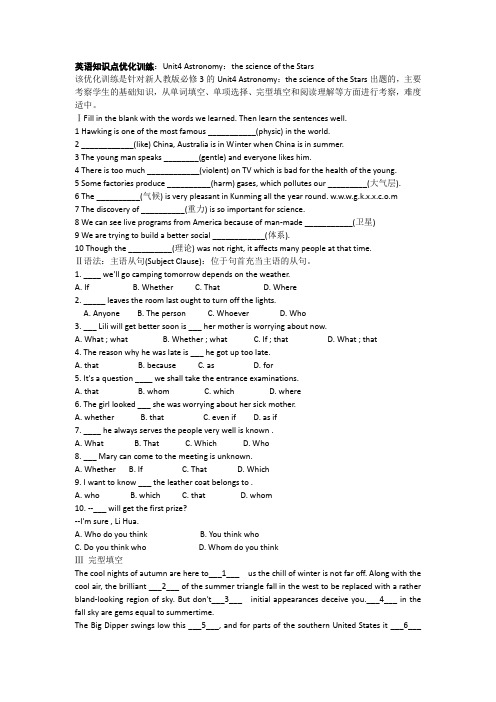
英语知识点优化训练:Unit4 Astronomy:the science of the Stars该优化训练是针对新人教版必修3的Unit4 Astronomy:the science of the Stars出题的,主要考察学生的基础知识,从单词填空、单项选择、完型填空和阅读理解等方面进行考察,难度适中。
ⅠFill in the blank with the words we learned. Then learn the sentences well.1 Hawking is one of the most famous ___________(physic) in the world.2 ____________(like) China, Australia is in Winter when China is in summer.3 The young man speaks ________(gentle) and everyone likes him.4 There is too much ____________(violent) on TV which is bad for the health of the young.5 Some factories produce __________(harm) gases, which pollutes our _________(大气层).6 The __________(气候) is very pleasant in Kunming all the year round. w.w.w.g.k.x.x.c.o.m7 The discovery of __________(重力) is so important for science.8 We can see live programs from America because of man-made ___________(卫星)9 We are trying to build a better social ____________(体系).10 Though the __________(理论) was not right, it affects many people at that time.Ⅱ语法:主语从句(Subject Clause):位于句首充当主语的从句。
Unit-4-Astronomy-the-science-of-the-stars
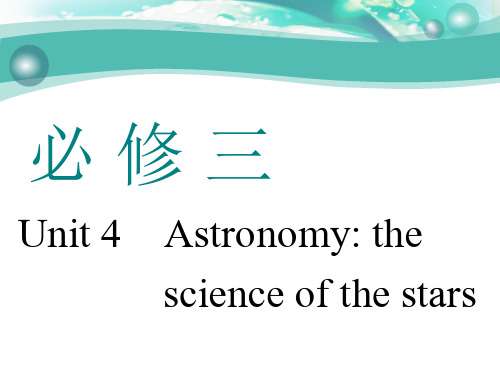
st night we had a discussion, which became more and more _v_io_l_e_n_t_. Finally we reached an agreement that we will never use violence whatever happens.(violent)
太阳系
14.carbon dioxide
二氧化碳
返回
Ⅱ.高频词汇(汉译英)
1. system n.
系统;体系;制度
2. religion n.
宗教;宗教信仰
3. theory n.
学说;理论
4. violent adj. 5. atmosphere n.
猛烈的;激烈的;强暴的 大气层;气氛
6. unlike prep.
返回
4.cheer up 感到高兴;感到振奋;(使)高兴;(使)振奋
(1)cheer sb. up cheer sb. on
(2)Cheers!
使某人振作起来 (比赛中)为某人喝彩;为某人加油 [口语](用于祝酒)干杯!
返回
5.puzzle n.谜;难题;(游戏的)猜谜 vt.& vi.(使)迷惑;(使)为难
8. pull n.& vt. 9. multiply vi.& vt.
拉(力);拖;牵引力 乘;增加
返回
拓展单词用活
[记全记牢]
1.religion n.宗教;宗教信仰→ religious adj.宗教的 2.theory n.学说;理论→theoretical adj.理论的;理论性的 3.violent adj.猛烈的;激烈的;强暴的→ violence n.暴
英语:Unit 4《Astronomy the science of the stars》教案-Reading 2(新人教版必修3)
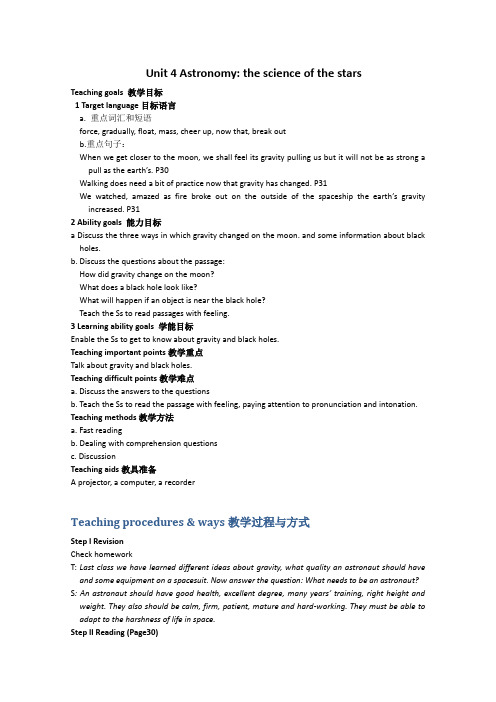
Unit 4 Astronomy: the science of the starsTeaching goals 教学目标1 Target language目标语言a. 重点词汇和短语force, gradually, float, mass, cheer up, now that, break outb.重点句子:When we get closer to the moon, we shall feel its gravity pulling us but it will not be as strong a pull as the earth’s. P30Walking does need a bit of practice now that gravity has changed. P31We watched, amazed as fire broke out on the outside of the spaceship the earth’s gravity increased. P312 Ability goals 能力目标a Discuss the three ways in which gravity changed on the moon. and some information about black holes.b. Discuss the questions about the passage:How did gravity change on the moon?What does a black hole look like?What will happen if an object is near the black hole?Teach the Ss to read passages with feeling.3 Learning ability goals 学能目标Enable the Ss to get to know about gravity and black holes.Teaching important points教学重点Talk about gravity and black holes.Teaching difficult points教学难点a. Discuss the answers to the questionsb. Teach the Ss to read the passage with feeling, paying attention to pronunciation and intonation. Teaching methods教学方法a. Fast readingb. Dealing with comprehension questionsc. DiscussionTeaching aids教具准备A projector, a computer, a recorderTeaching procedures & ways教学过程与方式Step I RevisionCheck homeworkT: Last class we have learned different ideas about gravity, what quality an astronaut should have and some equipment on a spacesuit. Now answer the question: What needs to be an astronaut? S: An astronaut should have good health, excellent degree, many years’ training, right height and weight. They also should be calm, firm, patient, mature and hard-working. They must be able to adapt to the harshness of life in space.Step II Reading (Page30)1.Ask the students to read the passage quickly and fill in the form. Then check the answer.T: In last lesson, we have learned some information about gravity. Today we’ll know gravity in details.2.Listen to the tape and imitate he tape. Then practice reading aloud the dialogue with feeling.3.Ask two or three pairs of Ss to read the passage with feeling.Step III Reading Task (Page66)This reading passage is about black holes.. After the first reading, let the Ss answer some questions. Show the questions on the screen. Then, let them talk about the form on page 67 after reading the text again.T: Last time we’ve learnt something about black holes in Listening. Do you remember Stephen Hawking’s idea about it?S: He thinks that black holes can both eat and spit objects out.T: Very good. Now we’ll read the passage about black holes. Turn to Page66, read it quickly and try to find the answers to the questions.Questions: 1.Can a black hole be seen? How do you know it’s a black hole?2.What happened to the spaceship from the beginning to the end?Check the answer with the whole class.Answers: 1.No, it can’t be seen. You can see things disappear into what appears to be an empty space.2.At first the lights on the spaceship went out and the computer stopped working.Then the spaceship jumped and began to move around the edge of the outside of thehole.As the spaceship moved around the hole, it began to go faster and faster.But then the spaceship jumped again, and it moved sideways from the black hole.It began to increase its speed until it seemed to be going as fast as light.At last the spaceship slowed down and the computer started working again.T: Now talk about the form on Page 67 with your partners.(A few minutes later,)T: All right.We’ll talk about the answers.Ask several students to answer them one by one, and then show suggested answers.Suggested answers:Step IV Extra-readingHere is a supplementary reading material on the screen, a passage about black holes. Read it carefully and then do some comprehension exercises with their partners.T: Till now, we have learned two passages about gravity and black holes. Here is a supplementary reading material on the screen. Read it carefully and prepare to do some reading comprehension exercises with your partners.Questions: 1.What’s a black hole?2.Why is it called black hole?3.What is called the singularity?4.What is called the event horizon?What is a Black Hole?A black hole is what remains when a massive star dies.If you have read How Stars Work, then you know that a star is a huge, amazing fusion reactor. Because stars are so massive and made out of gas, there is an intense gravitational field that is always trying to collapse the star. The fusion reactions happening in the core are like a giant fusion bomb that is trying to explode the star. The balance between the gravitational forces and the explosive forces is what defines the size of the star.As the star dies, the nuclear fusion reactions stop because the fuel for these reactions gets burned up. At the same time, the star's gravity pulls material inward and compresses the core. As the core compresses, it heats up and eventually creates a supernova explosion in which the material and radiation blasts out into space. What remains is the highly compressed, and extremely massive core.The core's gravity is so strong that even light cannot escape. This object is now a black hole and literally disappears from view. Because the core's gravity is so strong, the core sinks through the fabric of space-time , creating a hole in space-time -- this is why the object is called a black hole. The core becomes the central part of the black hole called the singularity. The opening of the hole is called the event horizon. You can think of the event horizon as the mouth of the black hole. Once something passes the event horizon, it is gone for good. Once inside the event horizon, all "events" (points in space-time) stop, and nothing (even light) can escape. The radius of the event horizon is called the Schwarzschild radius,named after astronomer Karl Schwarzschild, whose work led to the theory of black holes. Suggested answers:1. A black hole is what remains when a massive star dies.2. Because the core's gravity is so strong, the core sinks through the fabric of space-time , creating ahole in space-time -- this is why the object is called a black hole.3.The core becomes the central part of the black hole called the singularity.4.The opening of the hole is called the event horizon. Step V HomeworkCollect passages about gravity. Prepare for speakingHistoryThe concept of an object from which light could not escape (e.g., black hole) was originally proposed by Pierre Simon Laplace in 1795. Using Newton's Theory of Gravity , Laplace calculated that if an object were compressed into a small enough radius, then the escape velocity of that object would be faster than the speed of light.Photo courtesy NASAArtist concept of a black hole: The arrows show the paths of objects in and around the opening of the blackhole.。
- 1、下载文档前请自行甄别文档内容的完整性,平台不提供额外的编辑、内容补充、找答案等附加服务。
- 2、"仅部分预览"的文档,不可在线预览部分如存在完整性等问题,可反馈申请退款(可完整预览的文档不适用该条件!)。
- 3、如文档侵犯您的权益,请联系客服反馈,我们会尽快为您处理(人工客服工作时间:9:00-18:30)。
Day 4: God spoke and created the sun, moon and stars
Day 5: God spoke and created living creatures in the air and sea
Day 6: God spoke and created the land animals and man
2. What has happened after that? Atoms began to form and combine to create stars and other bodies.
A Big Bang
atom
stars
Reading for information: Para 2
For several million years after the" Big Bang"...
Stage2 The development of life
Reading for information: Para 4-5 Make a timeline of the development of life:
ertremely small plants appears in water
Shellfish and all sorts of fish
Stage 1 : The development of the earth (para 1—3)
Stage 2 : The development of life (para 4—5)
Reading for information: Para 1
1. What is the widely accepted theory? "A Big Bang" that threw matter in all directions.
Day 7: God rested and blessed this day calling it Holy
How Life Began on the Earth
Reading for structure:
This text can mainly divided into two stages:
astronomer
solar system
• eight planets • many comets • other objects
What are the English names of the eight planets that circle our sun?
金星 Venus
火星 Mars
esuarrtfhac'se.
atmosphere
other water nitrogen carbon
gases vapour
dioxide
Reading for information: Para 3
Water appeared on the _e_a_r_th___, besides that, water had also appeared on other planets like_M_a_r_s_, but it had _d_is_a_p_p_e_a_re_d_ later.
The earth became too hot to live on
1. Retell the passage according to the form.
2. Suppose you were the earth, what would you advise humans to do? Write a letter to the human being.
between 4.5 and 3.8years ago
a cloud of dust
a solid globe
it exploded with ven more important?
... mThaekeeatrhteh cooled down and water began to appear on its
Unit 4 Astronomy: the science of the stars
Astronomy is the scientific study of the universe and the heaven bodies (such as the sun, the moon, and stars), gas, and dust within it.
green plants began to grow on land
dinosaur
reptiles appeared
forests
land animals: insects&hibians
the rise of mammals
small clever animals with hands and feet
Pangu separates the sky from the earth
The Goddess Nuwa mended the heaven and created human beings from the clay(粘土).
God created the world in seven days:
水星 地球 Mercury Earth
木星
Jupiter
天王星 土星 Uranus Saturn
海王星 Neptune
Pre-reading
2. Each religion and culture has its own ideas about how life began on earth. What do you know? In China, we all know that Pangu separates the sky from the earth.
Day 1: God spoke and separated light from darkness creating Day and Night
Day 2: God spoke and separated the water creating sky and ocean Day 3: God spoke and created dry land Day 4: God spoke and created the sun, moon and stars Day 5: God spoke and created living creatures in the air and sea Day 6: God spoke and created the land animals and man Day 7: God rested and blessed this day calling it Holy
What a role the water played in the development of life? The presence of water allowed the earth to dissolve harmful gases and acids into the oceans and seas. This produce a chain reaction which made it possible for life to develop
Reading for information: Para 4-5
1.Who are the small clever animals with hands and feet? Human Beings
2. Are they taking care of the earth well? Why?
Because they are putting too much carbon dioxide into the atmosphere, which prevents heat from escaping from the earth into space.
